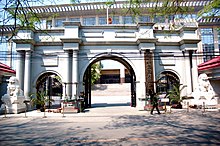
Back المحكمة الشعبية العليا Arabic সর্বোচ্চ গণ আদালত (চীন) Bengali/Bangla Nejvyšší lidový soud Čínské lidové republiky Czech Oberstes Volksgericht der Volksrepublik China German Corte Suprema Popular de la República Popular China Spanish Rahva Ülemkohus Estonian دیوان عالی خلق Persian Cour populaire suprême chinoise French Mahkamah Agung Rakyat ID Corte suprema del popolo della Repubblica Popolare Cinese Italian
| Supreme People's Court of the People's Republic of China | |
|---|---|
| 中华人民共和国最高人民法院 | |
 Supreme People's Court Emblem | |
 Main gate | |
 | |
| 39°54′10.7″N 116°24′18.9″E / 39.902972°N 116.405250°E | |
| Established | 22 October 1949[1] |
| Location | Beijing, China |
| Coordinates | 39°54′10.7″N 116°24′18.9″E / 39.902972°N 116.405250°E |
| Composition method | Presidential selection with National People's Congress approval |
| Authorised by | Constitution of the People's Republic of China |
| Judge term length | 5 years |
| Website | english |
| President and Chief Justice[2] | |
| Currently | Zhang Jun |
| Since | 11 March 2023 |
| Executive Vice President | |
| Currently | Deng Xiuming |
| Since | 5 July 2023 |

 |
|---|
|
|
The Supreme People's Court of the People's Republic of China (SPC) is the highest court of the People's Republic of China. It hears appeals of cases from the high people's courts and is the trial court for cases about matters of national importance.
According to the Constitution of China, the Supreme People's Court is accountable to the National People's Congress.[3][4]: 14 The court has about 400 judges and more than 600 administrative personnel.[4]: 16
The court serves as the highest court for the People's Republic of China and also for cases investigated by the Office for Safeguarding National Security in Hong Kong.[5] The special administrative regions of Hong Kong and Macau have separate judicial systems based on British common law traditions and Portuguese civil law traditions respectively, and are out of the jurisdiction of the Supreme People's Court.
- ^ About the Supreme People's Court Archived 1 September 2018 at the Wayback Machine (Chinese)
- ^ Judges Law of the People's Republic of China, Article 16: "Judges are divided into twelve grades. The President of the Supreme People's Court is the Chief Justice."
- ^ Ahl, Björn (6 May 2019). "Judicialization in authoritarian regimes: The expansion of powers of the Chinese Supreme People's Court". International Journal of Constitutional Law. 17 (1): 252–277. doi:10.1093/icon/moz003. ISSN 1474-2640.
- ^ a b Qi, Ding (2019). The Power of the Supreme People's Court: Reconceptualizing Judicial Power in Contemporary China. Abingdon-on-Thames, Oxford: Routledge. ISBN 9780429199479.
- ^ Law of the People's Republic of China on Safeguarding National Security in the Hong Kong Special Administrative Region (56). National People's Congress. 1 July 2020. Archived 3 July 2020 at the Wayback Machine